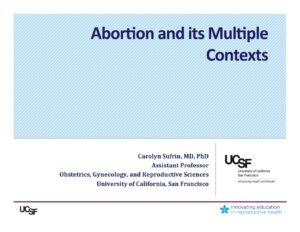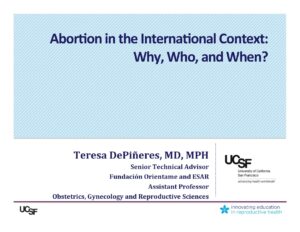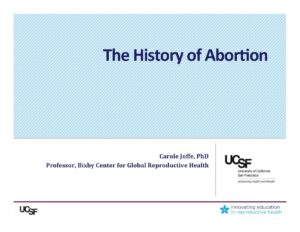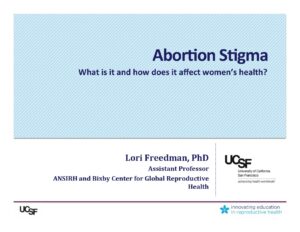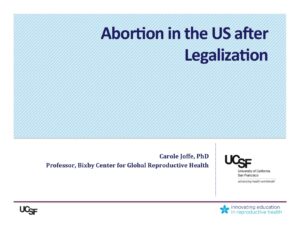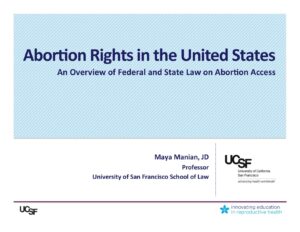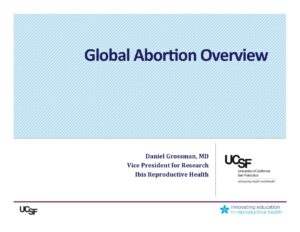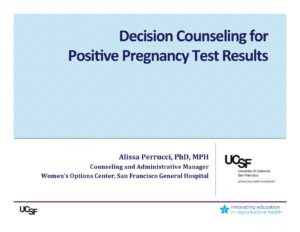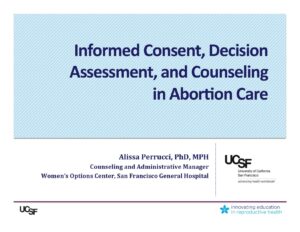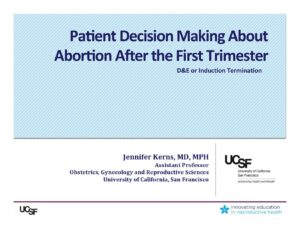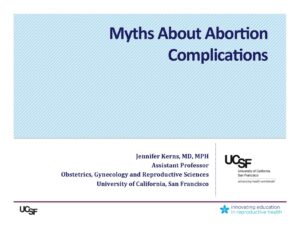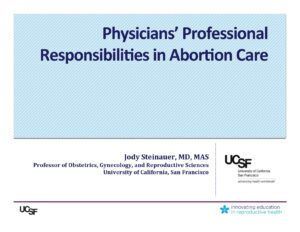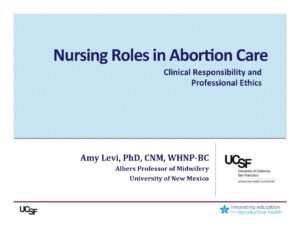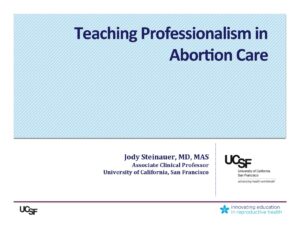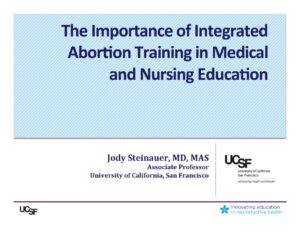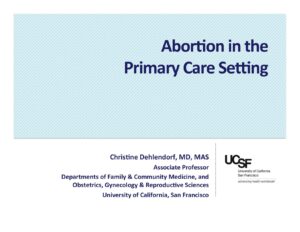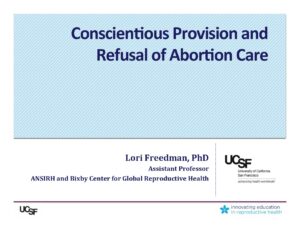Video Lecture Presented by:
University of California San Francisco
Click here to download this video lecture
Lecture can be viewed with subtitles in Spanish or French. French translation was made possible by the Safe Abortion Action Fund and International Planned Parenthood Federation. Click the Closed Captions button on video lectures to access subtitles.
Citations:
Newmann S, Dalve-Endres A, Drey EA, Planning SoF. Clinical guidelines. Cervical preparation for surgical abortion from 20 to 24 weeks’ gestation. Contraception 2008 Apr;77(4):308-14
Jones RK, Kooistra K. Abortion Incidence and Access to Services In the United States. Perspectives on Sexual and Reproductive Health: Guttmacher Institute; 2008
Cowett AA, Golub RM, Grobman WA. Cost-effectiveness of dilation and evacuation versus the induction of labor for second-trimester pregnancy termination. Am J Obstet Gynecol 2006 Mar;194(3):768-73.
Schechtman KBP, Gray DLM, Baty JD, Rothman SMM. Decision-Making for Termination of Pregnancies With Fetal An… : Obstetrics & Gynecology. 2015.
Drey EA, Foster DG, Jackson RA, Lee SJ, Cardenas LH, Darney PD. Risk factors associated with presenting for abortion in the second trimester. Obstet Gynecol 2006 Jan;107(1):128-35.
Foster DG, Jackson RA, Cosby K, Weitz TA, Darney PD, Drey EA. Predictors of delay in each step leading to an abortion. Contraception 2008 Apr;77(4):289-93.
Wyldes MP, Tonks AM. Termination of pregnancy for fetal anomaly: a population-based study 1995 to 2004. Bjog 2007 May;114(5):639-42.
Vargas J, Diedrich J. Second-trimester induction of labor. Clin Obstet Gynecol 2009 Jun;52(2):188-97.
Liu S, Joseph KS, Kramer MS, Allen AC, Sauve R, Rusen ID, et al. Relationship of prenatal diagnosis and pregnancy termination to overall infant mortality in Canada. Jama 2002 Mar 27;287(12):1561-7.
Henshaw RC, Naji SA, Russell IT, Templeton AA. Comparison of medical abortion with surgical vacuum aspiration: women’s preferences and acceptability of treatment. Bmj 1993 Sep 18;307(6906):714-7.
Harwood B, Nansel T. Quality of life and acceptability of medical versus surgical management of early pregnancy failure. Bjog 2008 Mar;115(4):501-8.
Creinin MD. Randomized comparison of efficacy, acceptability and cost of medical versus surgical abortion. Contraception 2000 Sep;62(3):117-24.
Bryant AG, Grimes DA, Garrett JM, Stuart GS. Second-trimester abortion for fetal anomalies or fetal death: labor induction compared with dilation and evacuation. Obstet Gynecol 2011 Apr;117(4):788-92.
Kelly T, Suddes J, Howel D, Hewison J, Robson S. Comparing medical versus surgical termination of pregnancy at 13-20 weeks of gestation: a randomised controlled trial. Bjog 2010 Nov;117(12):1512-20
Kaltreider NB, Goldsmith S, Margolis AJ. The impact of midtrimester abortion techniques on patients and staff. Am J Obstet Gynecol 1979 Sep 15;135(2):235-8.
Kerns J, Vanjani R, Freedman L, Meckstroth K, Drey EA, Steinauer J. Women’s decision making regarding choice of second trimester termination method for pregnancy complications. Int J Gynaecol Obstet 2012 Mar;116(3):244-8.
Steinauer J, Landy U, Filippone H, Laube D, Darney PD, Jackson RA.Predictors of abortion provision among practicing obstetrician-gynecologists: a national survey. Am J Obstet Gynecol 2008 Jan;198(1):39.e1-6.
Jones BS, Weitz TA. Legal barriers to second-trimester abortion provision and public health consequences. Am J Public Health 2009 Apr;99(4):623-30.
Finer LB, Frohwirth LF, Dauphinee LA, Singh S, Moore AM. Timing of steps and reasons for delays in obtaining abortions in the United States. Contraception 2006 Oct;74(4):334-44.
